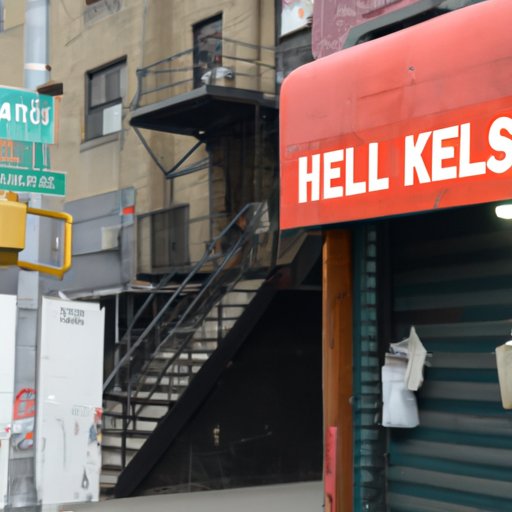Introduction
Hell’s Kitchen is a neighborhood located on the West Side of Manhattan in New York City. It has a long and colorful history, often associated with organized crime and gang activity. But today, the area is undergoing a period of rapid change, leading many to ask: Is Hell’s Kitchen dangerous?
Examining the Safety of Hell’s Kitchen: A Neighborhood in Transition
To understand the answer to this question, it is important to first look at the historical context of the area. Hell’s Kitchen was once a working-class Irish neighborhood, with a reputation for violence and crime. However, in recent years, the area has seen an influx of new residents, businesses, and development, leading to a dramatic transformation.
Recent changes have had a major impact on safety in Hell’s Kitchen. The area now boasts some of the city’s most desirable real estate, with luxury apartments and trendy restaurants. This has led to an increase in property values, as well as an influx of affluent residents who are willing to pay top dollar for a piece of the action.
At the same time, the area has become increasingly gentrified. This has resulted in a displacement of the original residents and a decrease in affordable housing options. As a result, there is a growing disparity between the wealthy newcomers and the poorer residents who remain, creating a tense atmosphere in the area.
Exploring the Risks and Rewards of Living in Hell’s Kitchen
Living in Hell’s Kitchen certainly has its benefits. The area offers convenient access to some of the city’s best restaurants, bars, and shopping. It also has excellent public transportation, making it easy to get around. Plus, the neighborhood is home to a vibrant arts and culture scene, with plenty of galleries, theaters, and music venues to explore.
However, there are potential risks of living in Hell’s Kitchen as well. Crime rates in the area are still higher than average, and the area is known for its drug trade and gang activity. Additionally, the influx of wealthy newcomers has led to increased tensions between the different socioeconomic groups, which can make the area feel unsafe at times.
Understanding the Role of Community Policing in Reducing Crime in Hell’s Kitchen
One way to address the issue of safety in Hell’s Kitchen is through community policing. Community policing is a type of law enforcement strategy that seeks to build trust and collaboration between police officers and the communities they serve. In Hell’s Kitchen, this means having police officers actively engage with residents and business owners, establishing relationships and addressing any issues or concerns they may have.
By engaging with the community and getting to know the people who live and work in the area, police officers can better identify potential criminal activity and intervene before it escalates. This can help reduce crime and create a safer environment for everyone.
Assessing the Impact of Gentrification on Safety in Hell’s Kitchen
Gentrification is another factor that can affect safety in Hell’s Kitchen. Gentrification is the process by which wealthier people move into a traditionally lower-income area, often resulting in higher property values, increased taxes, and displacement of the original residents.
In Hell’s Kitchen, the influx of wealthier residents has led to an increase in property values, but it has also had a negative impact on existing residents. Many of the area’s original inhabitants have been forced out due to rising rents and a lack of affordable housing. This can lead to feelings of resentment and distrust towards the newcomers, which can create an atmosphere of tension and insecurity.
Investigating the Relationship Between Poverty and Crime in Hell’s Kitchen
Poverty is also closely linked to safety in Hell’s Kitchen. Studies have shown that areas of high poverty are more likely to experience higher levels of crime. This is because poverty can lead to feelings of desperation and hopelessness, which can push some people to turn to crime as a means of survival.
In Hell’s Kitchen, poverty is a major problem. The area has one of the highest concentrations of low-income households in the city, and many of these families struggle to make ends meet. This can lead to a feeling of desperation and hopelessness, which can in turn lead to higher levels of crime.
Analyzing the Impact of Local Businesses on Safety in Hell’s Kitchen
Local businesses can also play an important role in creating a safer Hell’s Kitchen. By providing jobs and economic opportunities, local businesses can give residents a sense of purpose and hope for the future. This can help reduce crime by giving people something to strive for, rather than turning to illegal activities.
Additionally, local businesses can help create a sense of community in the area. They can provide a gathering place for neighbors to come together and get to know each other. This can help foster a sense of trust and security, which can make the area feel safer overall.
Investigating the Role of Public Spaces in Creating a Safer Hell’s Kitchen
Finally, public spaces can also help create a safer Hell’s Kitchen. Public spaces like parks and playgrounds provide places for people to gather and socialize, which can help build a sense of community. Additionally, these spaces can be used for educational and recreational activities, which can help keep people safe and engaged.
Public spaces can also act as deterrents to crime. Having people out and about in the area makes it less likely that criminals will target the area, as there are more witnesses to potentially report suspicious activity.
Conclusion
In conclusion, Hell’s Kitchen is a historically rich and vibrant neighborhood that is currently undergoing a period of rapid change. While the area has its risks, there are also many rewards for those who choose to live there. With the right policies and programs in place, Hell’s Kitchen can become a safe and welcoming place for all.


